Professor of English and Indigenous Studies Dr. Emil Keme and PhD Student Amelia Ali will be hosting a lecture on interrupting settler colonial borders and remapping Indigenous.
Time: 4:15 – 5:45pm
Place: Kemp Malone Library Callaway N301

What does it mean for something to be “because of love”?
Melanie A. Frye addressed this big question on February 6 as she discussed her work with the Mvskoke (Creek/Seminole) Language and her Native youth language educational program with the Emory community. Language is inextricably tied to one’s history, community, and identity. As such, she began her lecture in the Mvskoke language, introducing herself as a citizen of the Muscogee (Creek) Nation, a member of the Bird Clan, and from her tribal town of Eufaula on the Canadian River.
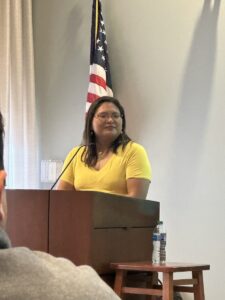 Mvskoke, like other Muskogean languages, roots itself in the Muscogee homeland and continues in five Mvskoke-speaking sovereign Nations in present-day Oklahoma. It is a language built on relationality between the speaker and their subjects. Just as clans hold dominant kinship and daughter towns maintain their ties to their mothers even after the Indian Removal Act of 1830. Some towns did not survive the displacement, however, their people carried on by reforming their kinships into new towns. Ancestral homelands still connect to Muscogee people today by functioning as ceremonial grounds.The Mvskoke word etvlwv translates into English as “tribal town” or “band” among Seminoles. . Etvlwv connotes that each town has a sovereign identity, with some like Thlopthlocco, receiving federal recognition as a tribal governance.
Mvskoke, like other Muskogean languages, roots itself in the Muscogee homeland and continues in five Mvskoke-speaking sovereign Nations in present-day Oklahoma. It is a language built on relationality between the speaker and their subjects. Just as clans hold dominant kinship and daughter towns maintain their ties to their mothers even after the Indian Removal Act of 1830. Some towns did not survive the displacement, however, their people carried on by reforming their kinships into new towns. Ancestral homelands still connect to Muscogee people today by functioning as ceremonial grounds.The Mvskoke word etvlwv translates into English as “tribal town” or “band” among Seminoles. . Etvlwv connotes that each town has a sovereign identity, with some like Thlopthlocco, receiving federal recognition as a tribal governance.
Frye reflected on her language journey. Her father–a first language speaker, her great uncle, Ms. Gloria McCarty, her mother–Margaret McCain Moulding, Mr. Galen Cloud, and Mrs. Linda Wood were her Mvskoke mentors, teaching her the grammar, structure, building blocks, and intricacies of the language. Frye has also worked with linguistics Dr. Jack Martin to compile a Mvskoke dictionary which can be accessed at the Emory Library. Frye’s linguistic journey continues at University of Oklahoma, teaching others the Mvskoke language. In teaching the language, Professor Frye initially focused on grammar, nouns, tenses, and verbs, but later transitioned to learning sentences and translations to increase student’s understanding. Now she emphasizes student interactions and building up functional Mvskoke such as verb conjugation which holds more significance compared to English. Frye led an example of sentence constructions and encoded meanings within Mvskoke. 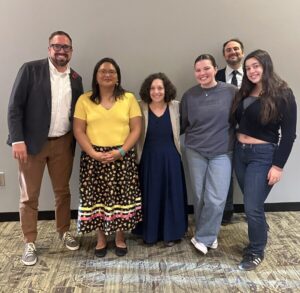
Not many Mvskoke citizens are first language speakers. The youngest native speaker was already in his 50s. She stressed the importance of Mvskoke youths and Indigenous youths at large to use their language as a part of their sovereignty and culture. No place is this more evident than her work with the youth of the Thlopthlocco Tribal Town. Frye explained that Thlopthlocco was the descendant of their mother tribal town Tukvpvcce. Thlopthlocco received federal recognition as a tribal government in 1939.
With a grant and permission from the Thlopthlocco elders, Frye runs a language and culture camp aimed to develop Native youth’s language and culture connections. For the 2023 session, Frye incorporated more culturally Mvskoke elements such as “Pipē Nocv,” a Mvskoke lullaby created during removal, and Luvc Hopoyet Ayvnks, a story written by Dr. Frye and edited by Mrs. Linda Wood based on “Pipē Nocv.” Over the three days students learned the lullaby through crafts, drawings, and recording themselves singing “Pipē Nocv.” Each student had physical memories of Pipē Nocv to encourage themselves to continue learning and sharing with their parents. As campers mature, Dr. Frye hopes to include these fluent speakers assisting her students during their cultural activities for this coming camp.
Because of love for her community, her language, and her descendants, she embarked on her mission to teach the next generation their history, their language, their culture, and hopefully inspire their future.
Click here to watch the full lecture: Vnokeckv Omēcicen: Because of Love
Click here to learn some Mvskoke words: Mvskoke (Creek) Language Chart
Click here to watch Introduction to Translanguaging, Language Reclamation, and Justice-Oriented Language Pedagogies
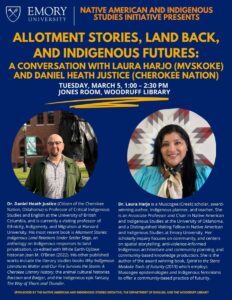
On March 5, Dr. Harjo (Mvskoke) and Dr. Heath Justice (Cherokee) will be hosting discussion about allotments, the Land Back Movement and Indigenous communities’s futures.
Time: 1:00 – 2:30 pm
Place: Jones Room in Woodruff Library
The Emory Wheel highlighted Dr. Melanie Frye’s presentation Vnokeckv Omēcicen (Because of Love): Working with the Mvskoke Language discussing language’s relation to its people, their history, and their future to a community of Emory students, faculty, and staff.
Emory hosts Mvskoke language teacher in continuation of relationship with Muscogee Nation
The Emory College Language Center host Dr. Melanie Frye, a proud citizen of the Muscogee (Creek) Nation, as she discusses her advocation for perpetuation and revitalization of the Mvskoke (Creek/Seminole) language and working with Native youth language and culture camps.
Click here for more information & Click here to register
Time: 4:00 pm – 5:30 pm
Place: Jones Room of Woodruff Library
Emory University’s Center for Native American and Indigenous Studies announces the appointment of Beth Michel as its Senior Associate Director.
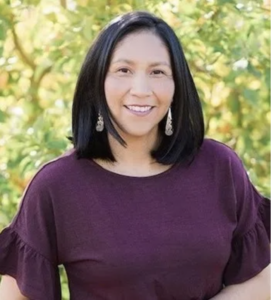 In this full-time leadership position, Michel will direct the Center’s strategic initiatives, continuing her work to foster thriving communities of Indigenous students, faculty, and staff at Emory, coordinate campus-wide programming and tribal community partnerships through events like the annual Muscogee Teach-In, and strengthen the development of a new minor in Native and Indigenous Studies.
In this full-time leadership position, Michel will direct the Center’s strategic initiatives, continuing her work to foster thriving communities of Indigenous students, faculty, and staff at Emory, coordinate campus-wide programming and tribal community partnerships through events like the annual Muscogee Teach-In, and strengthen the development of a new minor in Native and Indigenous Studies.
The Emory Center for Native American and Indigenous Studies launched in the Spring of 2023, building on Emory’s existing Native American and Indigenous Studies Initiative, which Ms. Michel directed. The Center for Native American and Indigenous Studies is dedicated to nourishing a vibrant intellectual community supports cross-disciplinary research and teaching, as well as opportunities for students to take coursework in NAIS and while respectfully engaging Indigenous communities.
“I am fortunate to continue building a space that embraces Native & Indigenous knowledge and supporting the strategic plans for the minor,” says Beth Michel as she steps into her new role.
Beth Michel is a proud citizen of the Tohono O’odham Nation as well as Hopi and Navajo. Previously, Michel served as Associate Dean of Undergraduate Admission and Office of Undergraduate Admission’s Lead for Native American Affairs at Emory University. Prior to joining Emory, Michel was an Indigenous evaluator at the Centers for Disease Control and Prevention (CDC), Division of Nutrition, Physical Activity and Obesity (DNPAO) as a contractor.
Michel received a Master of Public Health degree with a global health concentration from Rollins School of Public Health and a Bachelor of Science from the University of Arizona. In 2023, she was honored to receive the Women of Color Initiative (WOCI) Atlanta Collaborative in Higher Education Outstanding Atlanta Staff Impact Award.
The WOCI Atlanta Collaborative in Higher Education, a strategic alliance encompassing prominent institutions such as the Center for Women at Emory, Clark Atlanta University, Georgia Tech’s Office of Minority Educational Development (OMED), Emory University Office of Diversity, Equity, and Inclusion, Spelman College Women Research and Resource Center, STEM Atlanta Women, Inc, Women’s Resource Center at Georgia Tech, and MiTek, comprises a comprehensive network dedicated to the advancement of women across industry, research, and higher education. Women of Color Initiative Awards are given each year to students, faculties, staff and community leaders who have made significant contributions towards social justice, advocacy, higher education, scholarly achievements, or and/or building communities. of upliftment. Nominees gathered at Georgia Institute of Technology to celebrate the tremendous achievements participants have done over within Atlanta.
Associate Dean Beth Michel was honored to receive Women of Color Initiative (WOCI) Outstanding Atlanta Staff Impact Award. She noted that she did not receive this award alone but on behalf of the colleagues working with her.
Dean Michel reflected on how wonderful it was to be among fellow women passionate about their work. One of her favorite experiences was the brunch communed by all the finalists and other participants of the event. Women ate and shared their effects in their communities, aspirations for growth, and methods of collaboration. Emory Alas de un Mismo Pájaro, a Latinx performing and education dance group, performed during the award celebrations.
Dr. Malinda Lowery, Cahoon Family Professor of American History, shares her time with Dean Michel, “Beth is a trusted and generous leader. I am beyond thrilled that she has received this long overdue recognition for her work at Emory and in the Atlanta community. It demonstrates her remarkable impact.”
The most important thing Beth wanted others to take away from her experience is the vitality of community. She did not arrive at the podium alone but alongside the effects of her department, colleagues, students, and many others who strive with like-minded goals of the future. Ms. Beth urges others to find those communities to build themselves and others up.
NAISI congratulates Dr, Debra Vidali along side Emory News Center in her winning first place in the 2023 Ethnographic Poetry Competition of the American Anthropological Association’s Society for Humanistic Anthropology.
On October 27, NAISI and delegates from the Mvskoke Etvlwv celebrated the Second Annual Muscogee Teach-In.
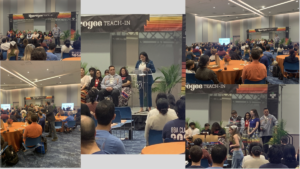
The Muscogee Teach-in opens with welcomes from Rev. Chebon Kernell, Tre’ Harp 25’C, Associate Dean Beth Michel, Mvhayv Eli Rowland, and Second Chief of the Muscogee Nation and his wife Del and Rhonda Beaver.
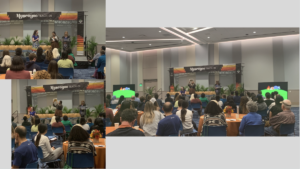
Mvhayv Jordan Squire and Carolyn McNac narratate Mvskoke stories while Mvhayv Eli Rowland acted them out. Audiences listened to these tales in Mvskoke joined to recite vocabulary and grammar like TOTKV (fire).
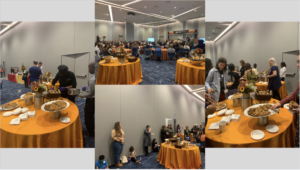
Emory students, staff, faculties, delegates of the Muscogee Nation, and guest sharing meals spanning multiple food customs for a shared plate.
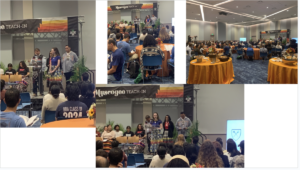
Rev. Kernell and Mvhayv Eli Rowland led in contemporary and traditional Mvskoke hymns. The audience followed along in their brochures.
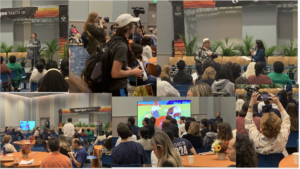
Artist Johnnie Diacon shares his childhood, what is meant for him to become an artist, his challenges and struggles of life, and how he was able to infuse those stories into his art.
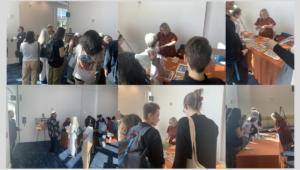
Nikki Diacon selling her husband’s art after his interview. She informs buyers the stories and process of each work, sharing their greater meanings to Emory art lovers.
Emory University’s Arts and Social Justice Fellows Program (ASJ) presents a project showcase and community conversation Tuesday, December 5 at the Switchyards Downtown Club. Doors open at 6 p.m. and programming begins at 7 p.m. The event is free and open to the public, registration is preferred.
Inspired by faith in the power of art to open spaces for conversation, community-making, and collective action, the ASJ Program brings Atlanta artists into Emory classrooms to help students translate their learning into creative activism in the name of social justice. Each artist is paired with an Emory faculty member to co-teach an existing course and design a relevant creative project for their students to produce throughout the semester.
A key concern of the ASJ program is connecting Emory students to Atlanta, partnering with Atlanta’s artists to give our students tools to work for change in their communities. Bringing our projects off the Emory campus and into Switchyards Downtown is part of that: connecting students with others in the city we all share. The event program includes live dance, theatrical skits, musical and spoken word performances. Prior to the performances, attendees are invited to explore multimedia art installations created in collaboration with Emory students, artist fellows, and additional Atlanta-based artists.
Time: 7:00 – 9:00 pm
Place: Switchyards Downtown Club (151 Ted Turner Drive Northwest Atlanta, GA 30303)